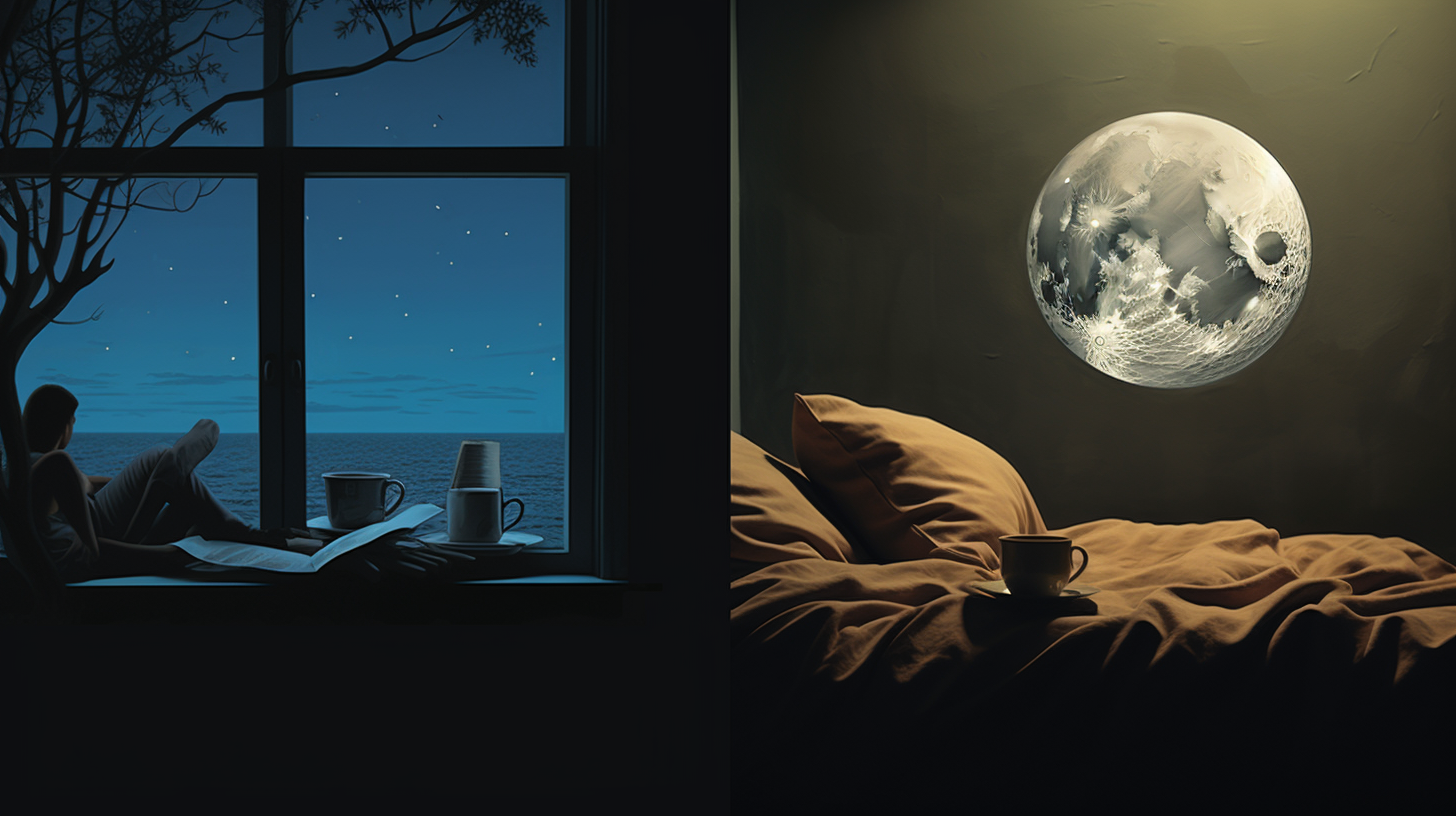Tired of tossing and turning? It’s high time you treated yourself to a royal rest.
In this article, you’ll uncover five best-kept secrets that can transform your nights. You don’t have to be born with a silver spoon in your mouth to sleep like royalty; it’s about creating the right conditions and habits.
So get ready – we’re about to dive into the realm of restful slumber!
Fed up with fatigue? Here are some easy tricks to help you sleep better.
Tired of feeling perpetually exhausted? It’s time to reevaluate your sleep routine.
Avoid caffeine, alcohol and nicotine
It’s best to steer clear of caffeine, alcohol, and nicotine as they can disrupt your sleep patterns.
Though you might feel drowsy after a glass of wine or a beer, alcohol acts as a stimulant just hours later. This can lead to frequent awakenings and reduced sleep quality during the latter part of the night.
Similarly, caffeine found in coffee, tea, chocolate, and cola is a stimulant that can interfere with your ability to fall asleep if consumed in the afternoon or evening.
Nicotine shares this stimulating effect too, delaying the onset of sleep.
So next time you’re reaching for that late cup of joe or after-dinner smoke, it’s worth considering how it might impact your night’s rest.
Your path to sleeping like royalty may start with ditching these substances!
Stick with a consistent bedtime and wake-up time every day.
You’ll find that sticking to a regular bedtime and wake-up time every day can greatly improve your sleep quality. This consistency helps regulate your body’s internal clock, promoting deeper, more restful sleep. While it might be tempting to sleep in on the weekends or take long afternoon naps, try to resist. These habits can disrupt your natural sleep rhythm and make it harder to fall asleep at night.
If you’re feeling drowsy during the day, short ‘power naps’ of 15-20 minutes can be beneficial without disturbing your nighttime sleep schedule.
Additionally, establish a relaxing pre-sleep routine that signals to your body that it’s time for bed. This could include reading a book, taking a warm bath, or practicing mindfulness techniques like deep breathing exercises.
Get your exercise in during the morning.
Getting your workout done earlier in the day, particularly in the morning, can promote better sleep quality at night. Regular exercise is known to foster sounder sleep. However, exercising too close to bedtime might make falling asleep more difficult for you.
This is because physical activity triggers the production of cortisol, a stress hormone that energizes you.
So what should you do? It’s simple: adjust your workout schedule. Aim to finish any vigorous exercise at least three hours before hitting the sack. This gives your body ample time to wind down and prepare for restful sleep.
Make a comfortable sleep space.
Creating a comfortable sleep environment is crucial, and that includes investing in a good-quality mattress and pillows. Your body needs proper support to relax fully during rest.
A room temperature between 65 to 70 degrees Fahrenheit promotes optimal slumber; too hot or cold can disrupt your sleep cycle.
Silence is golden for quality sleep but, if that’s not possible, consider using room-darkening shades or a white noise machine to block out external disturbances. These tools help create a quiet, serene space conducive to restful sleep.
Remember, your bedroom should be just for sleeping. Keep the area clutter-free to prevent distractions when winding down at bedtime.
Establishing these conditions allows you to create an inviting atmosphere primed for uninterrupted, rejuvenating rest every night.
Establish a relaxing bedtime routine to unwind
It’s essential to develop a soothing pre-sleep routine that aids in relaxing your mind and body before bedtime. This could involve taking a warm bath, reading a book, or engaging in a relaxation practice such as meditation. These activities help shift your body into sleep mode by signaling the end of the day.
However, it’s crucial to avoid stressful tasks like dealing with finances or work projects close to bedtime as these can stimulate your brain and make it harder for you to fall asleep.
Limiting exposure to technology is another key part of this routine because electronic devices emit light that interferes with sleep. Consider disconnecting from screens an hour before bed and implementing low-tech alternatives to wind down effectively.
If you continue experiencing difficulty sleeping, don’t hesitate to seek professional help as chronic insomnia may indicate an underlying health issue.
Ditch electronic sleep disruptors
You’ve got to ditch those electronic devices before bed if you’re serious about improving your sleep quality. Studies show that the light emanating from screens can disrupt your sleep patterns. This blue light suppresses melatonin, a hormone that regulates sleep, making it harder for you to fall asleep and reach deep restorative stages of slumber.
Additionally, engaging with technology keeps your mind active when it should be winding down.
So try going low-tech an hour or two before bedtime. Instead of scrolling through social media or watching TV, read a book or listen to calming music. Consider using an old-fashioned alarm clock instead of relying on your smartphone.
It’ll be tough at first, especially if you’re tech-tied like many are today, but the benefits to your sleep will make this change worth it.
If you can’t sleep well regularly, consider seeking assistance.
Shouldn’t ignore the possibility of a health issue if you’re struggling to sleep well on a regular basis. Consulting with a healthcare provider could be beneficial. Chronic insomnia might suggest an underlying medical condition requiring attention. If your sleep hygiene practices aren’t improving your sleep quality, it’s time to seek professional help.
Here are some steps you might consider:
- Schedule a visit with your primary care provider.
- Discuss your symptoms and concerns.
- Request necessary tests or referrals to specialists.
- Explore treatment options.
- Medication may be prescribed.
- Cognitive Behavioral Therapy (CBT) could provide relief.
Conclusion
So, you’re finally ready to prioritize your sleep. Remember, it’s all about routine, comfort, and mindfulness.
Ditch the caffeine before bed, create a serene sleep space, and keep that smartphone away from your pillow.
Look after your overall health with regular exercise and balanced meals.
Don’t forget – if sleep issues persist, professional help is there for you.
Start tonight; a well-rested tomorrow awaits!
Frequently Asked Questions
You might think alcohol aids sleep, but it actually disrupts quality rest. Also, while you may believe napping ruins nighttime sleep, a short afternoon nap can refresh you without disturbing your night’s slumber.
As you age, your sleep patterns and quality can change. You may find it harder to fall asleep and more frequent wake-ups. You’ll likely experience less deep sleep, making you feel less refreshed in the morning.
Yes, you’ll find great sleep apps like “Calm” and “Headspace” for meditation and relaxation. Gadgets such as Fitbit track sleep patterns. Philips’ Wake-Up Light simulates sunrise to wake you up naturally. Always consult reviews before purchasing.
You’ve asked about sleep medication side effects. They can include drowsiness, confusion, memory issues, and even sleepwalking. It’s crucial to discuss these risks with your doctor before starting any new medication regimen.
Sleep deprivation can severely impact your mental health. It’s linked to mood swings, depression, anxiety and decreased cognitive function. Consistent lack of sleep may even increase susceptibility to more serious mental health disorders.



